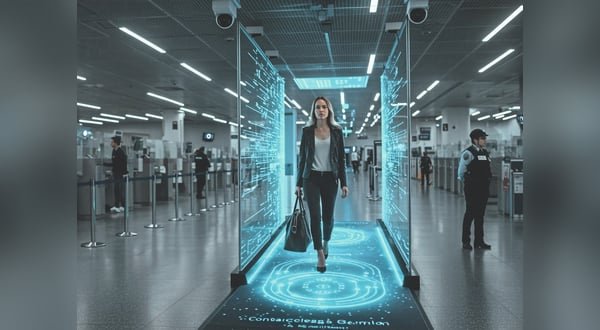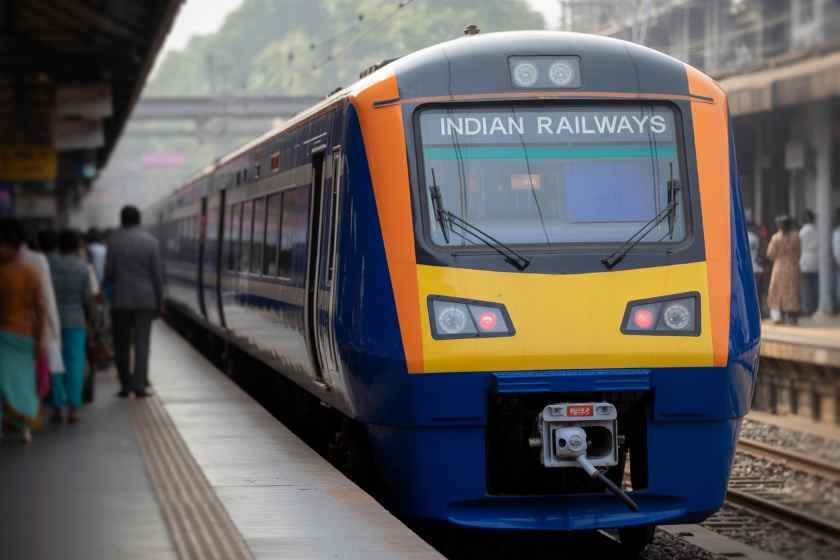In a country that’s synonymous with futuristic skylines and hyper-connected infrastructure, it’s no surprise that the UAE is redefining what it means to travel. From the moment a trip is planned to the final post-travel review, artificial intelligence (AI), biometrics, and automation are increasingly at the heart of the experience. Airports are becoming smarter, travel planning is more personalised than ever, and reliability is being re-engineered by the minute.
A New Era of Intelligent Travel
Dubai International Airport (DXB) is leading the charge when it comes to next-gen travel experiences powered by AI. As the world’s busiest international hub, the pressure to deliver smooth, secure, and swift passenger journeys is immense and technology is rising to the occasion. “AI is revolutionising the UAE travel journey from start to finish,” says Omar Bin Adai, Chief Technology and Infrastructure Officer of Dubai Airports. “At DXB, biometric smart gates offer seamless passport control with facial verification, eliminating manual checks. Our new ‘Unlimited Smart Travel’ takes this further, enabling up to 10 guests to complete immigration in just 14 seconds using facial recognition alone.”
Beyond passenger flow, AI is working hard behind the scenes. According to Adai, predictive maintenance and AI-driven baggage systems are ensuring near-perfect operations. “In Q1 2025 alone, DXB processed over 21 million bags with a 99.8% accuracy rate and one of the world’s lowest mishandling rates – 1.95 per 1,000 passengers.”
These numbers aren’t just impressive—they represent a growing commitment to using data and intelligence to deliver exceptional guest experiences. “This strategic integration of AI across every touchpoint exemplifies how the UAE is setting a global standard for intelligent, customer-centric travel infrastructure,” Adai adds.
While airports are getting smarter, so too is the way travellers plan their trips. Platforms powered by generative AI such as ChatGPT and Gemini are transforming the discovery phase of travel, giving users the ability to explore destinations, craft itineraries, and make informed decisions faster than ever before.
“We’re seeing strong uptake of AI-powered tools that support travellers, particularly during the research and planning phases of a trip,” says John Bevan, CEO of dnata Travel Group. “Platforms like ChatGPT have made travel information more accessible, helping users generate ideas and structure itineraries in seconds.”
Still, the technology has room to grow. “These platforms can struggle with the complex logistics of a full travel journey – managing bookings across multiple suppliers, handling real-time availability, and dynamic pricing. But the potential is enormous, especially in hyper-personalisation,” Bevan notes.
At dnata, the focus is on using AI to augment human expertise, not replace it. “We’re excited about this future. We’re integrating AI not just for efficiency, but to amplify the knowledge of our travel consultants – making it faster and smarter to deliver relevant, high-quality advice at scale.”
Elevating the Travel Experience
Technology is reshaping customer service like never before. Mobile apps, chatbots, and virtual assistants have become vital touchpoints, offering travellers personalised, real-time support that transforms uncertainty into confidence. Bin Adai highlights the profound impact: “In today’s travel landscape, the real game-changer has been placing instant, personalised support directly into passengers’ hands. Mobile apps and virtual assistants, particularly intuitive tools like DXB’s wayfinding app, have reshaped how travellers interact with airports.”
Among these innovations is DXB Express Maps, a dedicated app for Dubai International Airport that provides travellers with interactive 3D maps and a user-friendly interface to easily find gates, dining options, and other facilities. “Instead of uncertainty, travellers now effortlessly navigate complex terminals, access timely flight information, and manage their journeys seamlessly,” Bin Adai adds.
Complementing this is Pocket Flights, an app that gives instant access to real-time flight updates by simply scanning a QR code on flight status screens. Available in both English and Arabic across DXB and DWC airports, it delivers comprehensive information including gate changes, walking distances, wait times, and departure details — all at travellers’ fingertips.
The Airport Community App, affectionately dubbed the “mini-AOCC in your pocket,” supports over 59,000 users across 170+ entities in the oneDXB community. It merges user-driven features with operational tools designed to enhance guest experience and streamline airport efficiency. “This initiative strengthens internal communication and positions the app as an essential daily platform for the entire airport community,” Bin Adai explains.
Looking ahead, AI-driven recommendation engines are set to raise the bar even higher. “These systems are increasingly sophisticated, anticipating traveller preferences with precision and offering tailored, trusted suggestions,” says Bin Adai. “Ultimately, it’s about empowering the traveller with technology that feels human and intuitive, ensuring they always feel supported, understood, and confident at every step.”
Bevan echoes this sentiment but underscores the balance between speed and reliability: “Customer service today is increasingly being defined by immediacy and availability, especially in the travel sector where support is expected instantaneously – whether a person is booking a flight at midnight or making last-minute changes during a layover.”
While dnata is exploring consumer-facing chatbots as part of its future roadmap, its current AI investments focus on backend operations. “We’re already using AI to support training and quality assurance, including automated call listening capabilities that help us monitor service levels, identify pain points, and continuously improve our customer experience,” Bevan explains.
He adds that AI is also automating time-consuming manual processes, freeing teams to engage in higher-value interactions. “As we continue evaluating advanced communications technologies, accuracy and reliability remain key considerations. It’s not just about speed – it’s about ensuring the tools can provide relevant, context-aware support.”
Smart Journeys Ahead
No longer content with just convenience and punctuality, today’s traveller expects more — more control, more personalisation, and a more immersive experience from the moment a trip is imagined to the moment it ends.
According to Bin Adai, the shift is unmistakable. “Travellers in the UAE are increasingly expecting journeys that are not just seamless, but also smart, personalised, and immersive,” he says. “There’s a clear shift from traditional travel touchpoints to tech-enabled experiences that feel intuitive and engaging.” This evolution is powered by technologies like facial recognition for smoother immigration, AI-generated travel suggestions, and mobile-first tools that allow real-time support and bookings at the swipe of a screen. Airports like DXB have already embraced wayfinding apps and digital integration to deliver convenience with minimal friction.
But the transformation doesn’t end at the airport gates. “Travellers want digital convenience from planning to post-travel feedback,” Bin Adai notes. “Mobile-first platforms, immersive booking tools, and real-time support are no longer luxuries; they’re the baseline.”
This growing appetite for tech-forward travel solutions is not without its caveats. While AI and automation are streamlining the experience, the demand for human-centric service remains strong. “Technology is elevating convenience and efficiency, but the human touch remains essential,” he adds. “Dubai Airports continues to prioritise hospitality and in-person support, ensuring that travellers receive empathetic, culturally attuned service alongside advanced digital solutions.”
While echoing the sentiment, Bevan highlights an important distinction: modern travellers aren’t only looking for fast and easy experiences, they’re looking for assurance and options. “Travellers in the UAE today expect more than just convenience – they want control, flexibility, and confidence throughout their journey,” he explains. “What we’re seeing is a shift toward multi-channel and tech-enabled planning, where people want the freedom to engage with travel brands on their own terms — whether that’s online, in-store, through an app, or over the phone.”
For providers like dnata, that means maintaining consistency across all platforms and understanding that one solution won’t fit all. “Different age groups and lifestyles require different touchpoints, and it’s our responsibility to meet those needs with consistency, safety, and reliability,” says Bevan. “That means offering a seamless, secure experience whether a customer is booking through a chatbot at midnight or sitting down with an agent in one of our retail shops.”
He also underscores a key concern in this new era of digital interaction: trust. “As travellers share more information to receive personalised recommendations, they also expect us to handle that data with the highest levels of security,” Bevan notes. “Ultimately, it’s about building confidence, combining immersive and tech-integrated tools with the trust and assurance people need to feel good about their travel choices.”
What’s Next?
Over the next five to ten years, the country is poised to lead a radical shift toward intelligent, hyper-connected travel experiences that prioritise both ease and personalisation. “Over the next decade, the UAE is poised to lead a global shift toward smarter, fully connected travel,” says Bin Adai. “Biometric and contactless journeys will soon become the norm, enabling passengers to move through airports without ever presenting a document.” This vision is being woven into the very blueprint of the UAE’s next aviation mega-project — the expansion of Dubai World Central – Al Maktoum International (DWC). “The new airport will set a new benchmark for efficiency, capacity, and traveller-centric design,” Bin Adai adds.
From personalised service delivery and proactive customer support to predictive maintenance and operational efficiency, AI will touch every corner of the travel experience. “Our new digital experience project will cater to the latest AI technologies, helping elevate guest services to an entirely new level,” says Bin Adai. Looking further ahead, he sees the seamless integration of autonomous air taxis, high-speed ground transit, and eco-conscious infrastructure as part of a broader mobility ecosystem cementing the UAE’s place as a global hub for future-ready travel.
Bevan shares a similarly bold outlook. “Looking ahead, we see technologies like AI-generated itineraries, biometric-enabled travel, and predictive pricing engines becoming standard across the UAE’s travel landscape,” he says. “These tools are already beginning to take shape and in a region as digitally advanced and globally connected as the UAE, adoption will only accelerate.”
Kushmita Bose
As a passionate storyteller and content writer, Kushmita Bose loves weaving narratives that inform, inspire, and entertain. Whether she’s unraveling tech revolutions, dissecting industry reports, or bringing a brand’s journey to life, Kushmita thrives on transforming ideas into captivating stories.
When she’s not busy crafting content, you’ll probably find her daydreaming about her next travel adventure.



































You must be logged in to post a comment Login